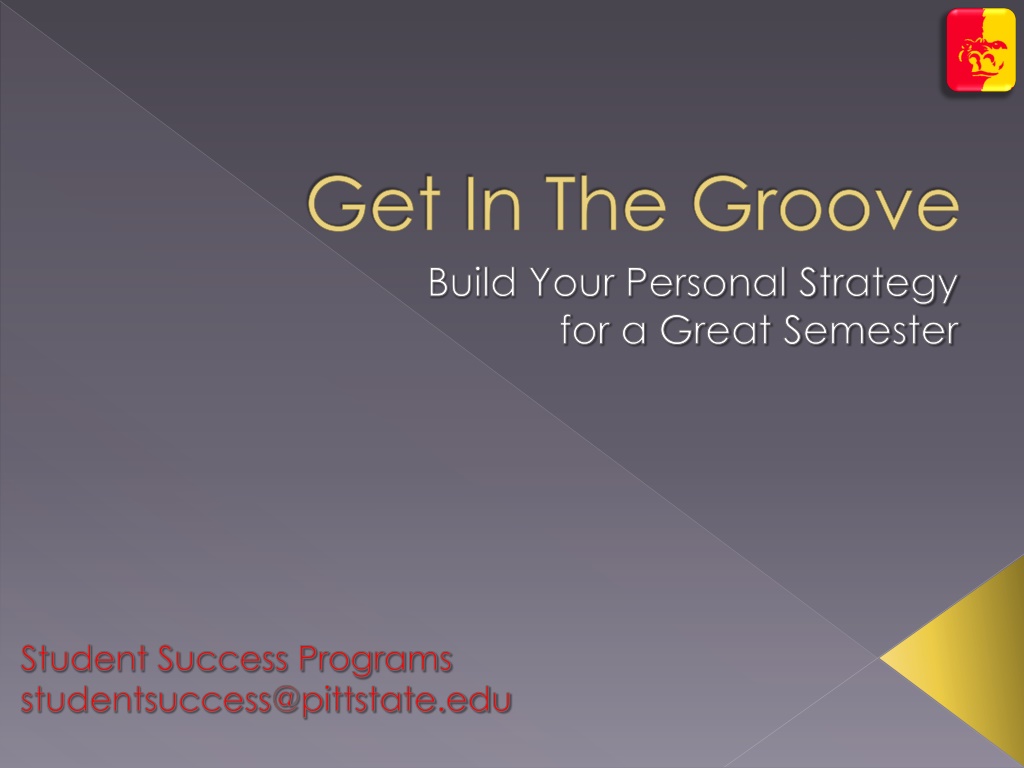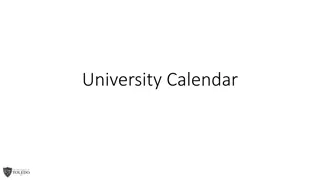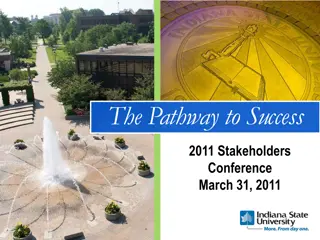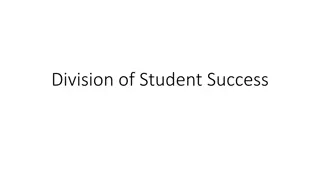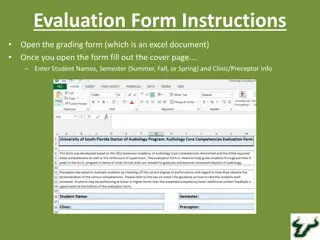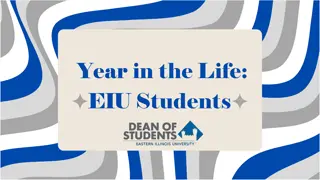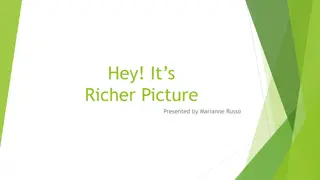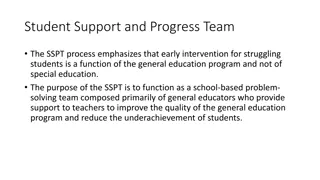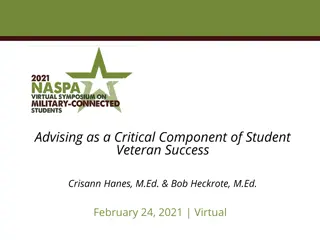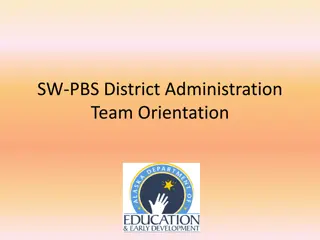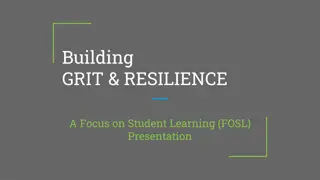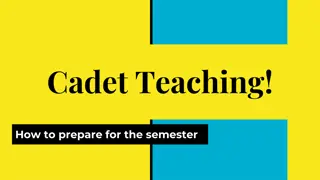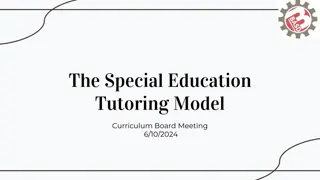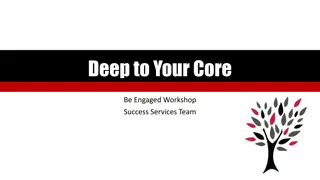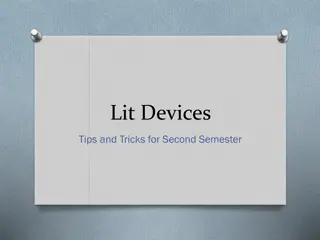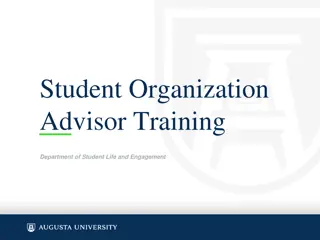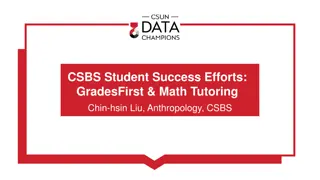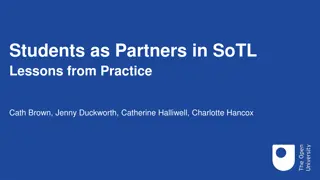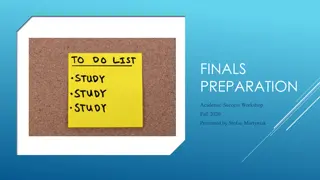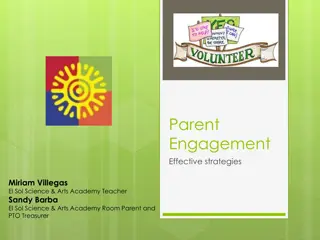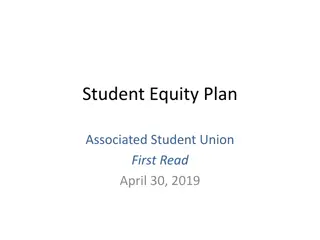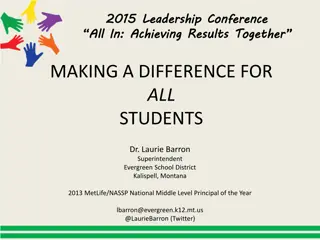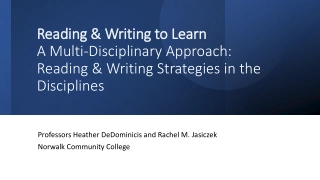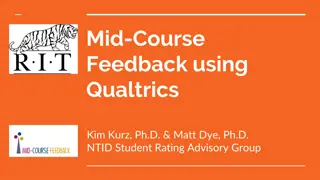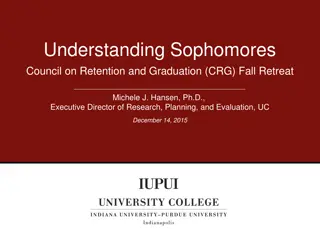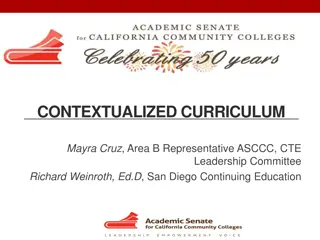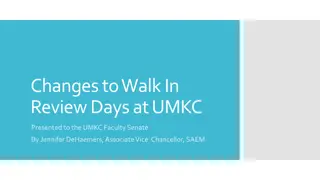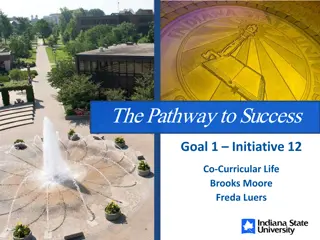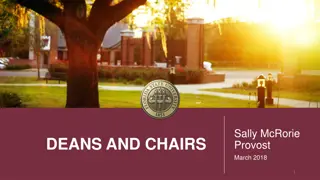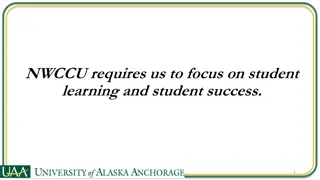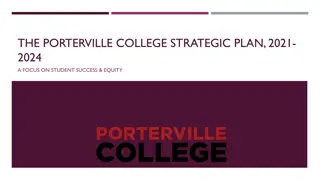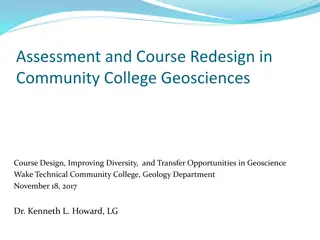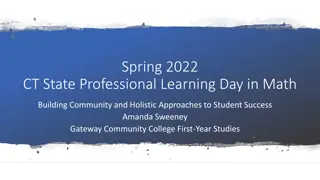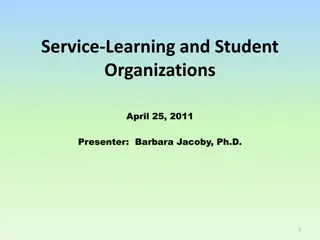Student Success Strategies for a Great Semester
Discover effective student success strategies including setting SMART goals, utilizing textbooks smartly, practicing the Four Rs method, and optimizing study sessions for better retention. Remember, success is a result of preparation meeting opportunity.
Download Presentation

Please find below an Image/Link to download the presentation.
The content on the website is provided AS IS for your information and personal use only. It may not be sold, licensed, or shared on other websites without obtaining consent from the author. Download presentation by click this link. If you encounter any issues during the download, it is possible that the publisher has removed the file from their server.
E N D
Presentation Transcript
Get In The Groove Build Your Personal Strategy for a Great Semester Student Success Programs studentsuccess@pittstate.edu
186116 gorilla.eps Goal Setting
Goal Setting SMART goals Specific Measurable Attainable Relevant Timely
Use Your Textbooks Take Note Communicate It s About Time
Use Your Textbooks Success always comes when preparation meets opportunity. ~Henry Hartman
With hocked gems financing him, he defied all scornful laughter that tried to prevent his scheme. Your eyes deceive, they said. It is like a table, not an egg. Now three sturdy sisters sought truth. As they forged along, sometimes through calm vastness, yet more often over turbulent peaks and valleys, their days became weeks as many doubters spread fearful rumors about the edge. At last, from nowhere winged creatures appeared, signifying the journey s end.
The Four Rs Read Recite Review Repetition
Reading the Text Read: pre-read the chapter Read to answer questions Answer questions in your own words Recite: talk to yourself Read questions, answers & notes out loud
Reading the Text Review: re-read your notes Frequent review = better retention & less study time Repetition: the 4th R
10 minutes of study 5 minutes 2-4 minutes of study of study 100%- - - - - - - - - - - - - - - - - - - - - - - - - - - - - - - - - - - - - - - - - - - - - - - - - - - - - - - - - - - - - - - - - - - Recall Day 1 Day 2 Day 7 Day 30 Short-Term Memory Long-Term Memory
Take Note Always have a plan and believe in it. Nothing good happens by accident. ~Chuck Knox, NFL coach
Preview Review Attend
Preview: Before Class Best practices Review previous day s class notes Read textbook assignments & take notes Note items that are unclear or confusing Develop questions to ask in class Examine returned homework & tests
Preview Review Attend
Attend: During Class Don t just sit there: BE there Active Listening: Intentionally focus on the speaker in order to understand Seat yourself appropriately close to the instructor Avoid distractions: a window, talkative neighbor, noisy fan, etc Are hearing and listening the same thing?
Attend: During Class Note-Taking Start each day s notes on a new page Note questions posed by the instructor Listen for clue phrases Here s the key It is important to note that Repetition In other words As I mentioned previously
Attend: During Class Note-Taking If there is a summary at the end of the lecture, pay close attention to it Check the organization of your notes Copy the main points in the summary
Preview Review Attend
Review: After Class Review notes Immediately after class Before you leave the classroom, if possible Clear up illegibility, check for errors, fill in facts & examples Ask for clarification from instructor, classmates, text, etc Taking notes is pointless unless you intentionally engage in the class and regularly review your notes.
Communicate Professors are people too!
Communicate Communicate with your Instructors Syllabus Office Hours Email Before/After Class Formal Doctor (Dr), Mister (Mr), Mrs, Professor
Communicate Suggested Conversations Use e-mail to communicate with an instructor Discuss grades or assignments with an instructor Talk about career plans Discuss ideas from your readings outside of class Ask for feedback (written or oral) from instructors on your performance
Communicate Instructor s lecture style Lecture-style may not match your preferred way of receiving new information Topic-List Question-Answer Compare-Contrast Series of Events Cause-Effect Problem-Solution Awareness of your instructor s lecture- style will help you format your notes and follow along more successfully.
Its About Time Don't let the fear of the time it will take to accomplish something stand in the way of your doing it. The time will pass anyway; we might just as well put that passing time to the best possible use. ~Earl Nightingale
Procrastination Identify Self-Check Is there a pattern? Are there certain types of tasks I avoid doing until the last minute? How do I know when I m procrastinating? Do I have a favorite replacement activity(ies)?
Procrastination Take Action Identify productive replacement activities you find yourself doing when you procrastinate: activities you need to do but are not a priority. Consider time-wasting replacement activities you find yourself doing when you procrastinate: activities you do not need to do.
Success Resources Student Health Center: nutritionist, healthcare, counseling Tutoring Rec Center SAC RA, friends, family Professors
Get In The Groove Build Your Personal Strategy for a Great Semester Follow us on Social Media: Twitter & Instagram: @PSUSuccess Facebook: PSU Student Success Center Student Success Programs StudentSuccess@pittstate.edu
References Academic Resource Center, Sweet Briar College, VA. (accessed October 2010). Reading Methods: SQ3R. Retrieved from http://www.arc.sbc.edu/sq3r.html . Academic Skills Program, University of Canberra, Australia. (accessed October 2010). Reading and Remembering. Retrieved from http://www.canberra.edu.au/studyskills/learning/reading . Aspire Program. Keene State College. (accessed October 2010). No-Nonsense Note Taking. Retrieved from http://www.keene.edu/aspire/nonsense.cfm. Center for Academic Success, Louisiana State University. (accessed October 2010). Note Taking and Comprehension. Retrieved from www.cas.lsu.edu. Dietsche, Vivinette K. (accessed October 2010) Note-taking: Top 5 Tips. Retrieved from http://jerz.setonhill.edu/writing/academic/notes-tips.htm.
References, cont. Covey, Stephen. (accessed February 2011). The Seven Habits of Highly Successful People. Retrieved from https://www.stephencovey.com/7habits/7habits- habit3.php . Hazard, Laurie, 2011. Psychology of Procrastination , The Academic Center for Excellence, Bryant University, Smithfield, RI. Sanger Learning & Career Center, The University of Texas at Austin. (accessed February 2011). Setting Priorities: how to get the most out of your time. Retrieved from http://www.lifelearning.utexas.edu/handouts/setting%20pri orities.pdf.
